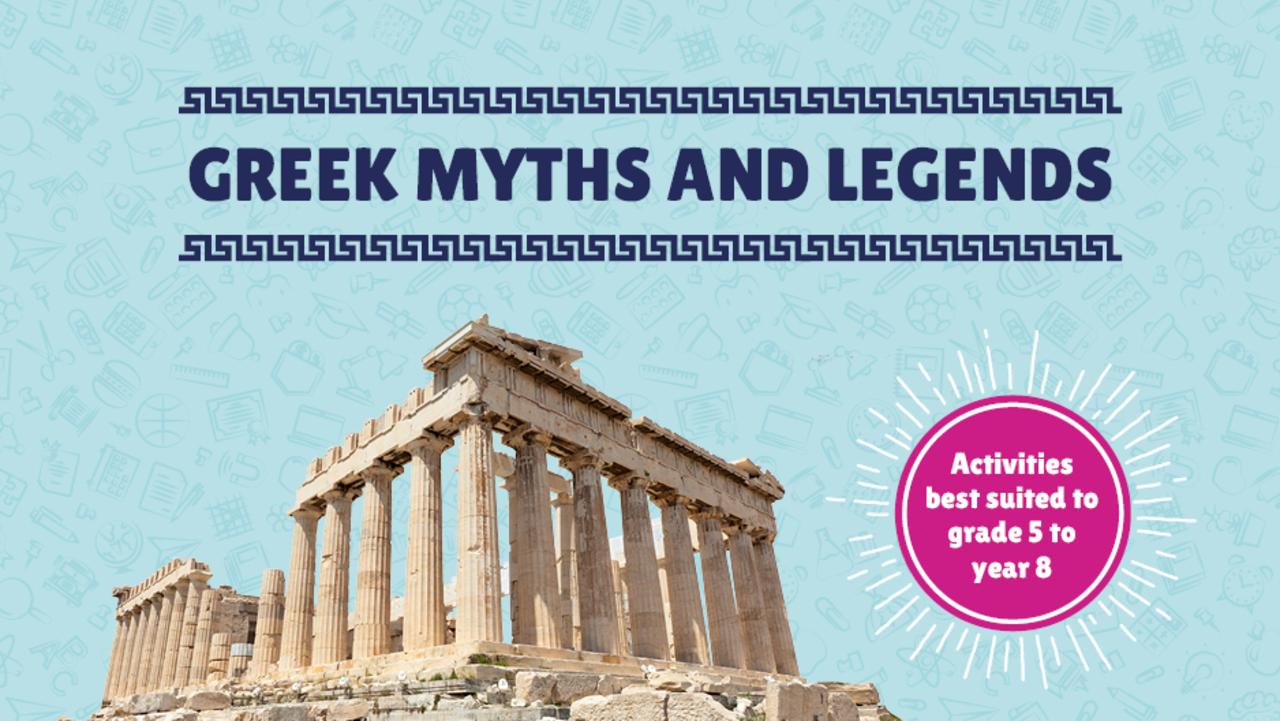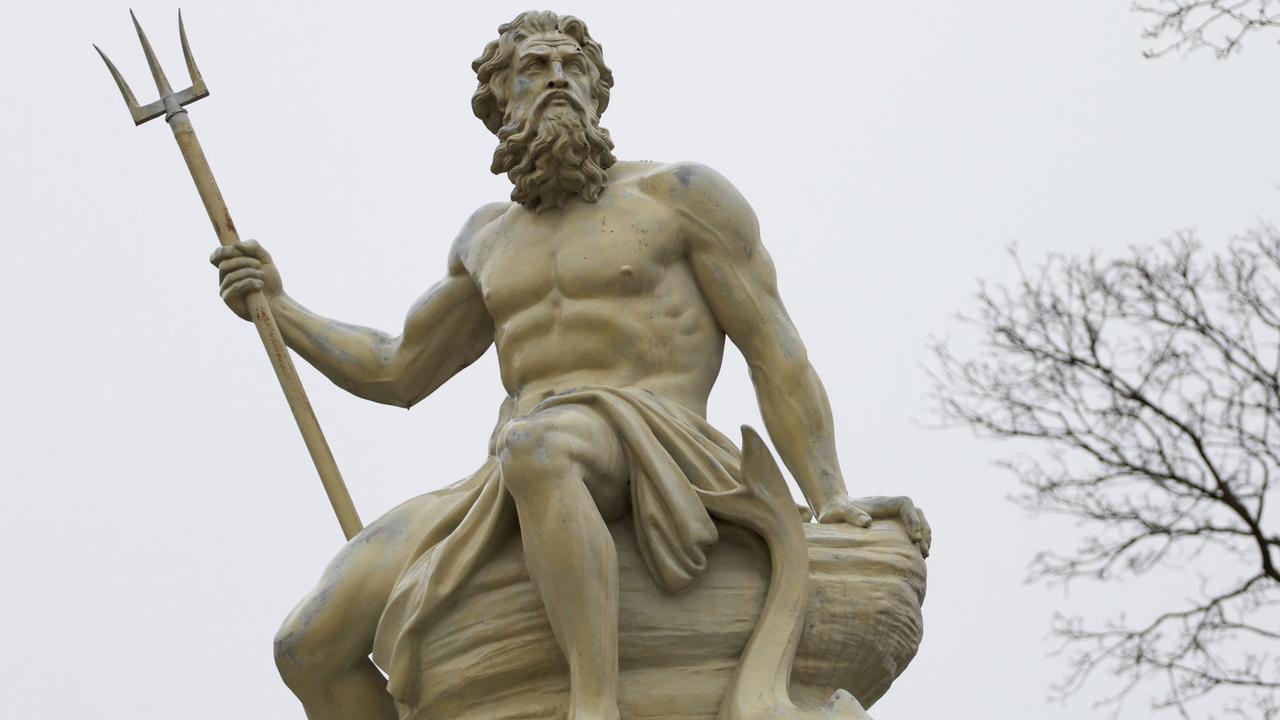Greek Mythology was a time of brave heroes and courageous warriors
Heroes in Greek Mythology were men and women of special strength, courage and abilities. Upon completing their tasks they were made immortal by the Gods to honour their bravery
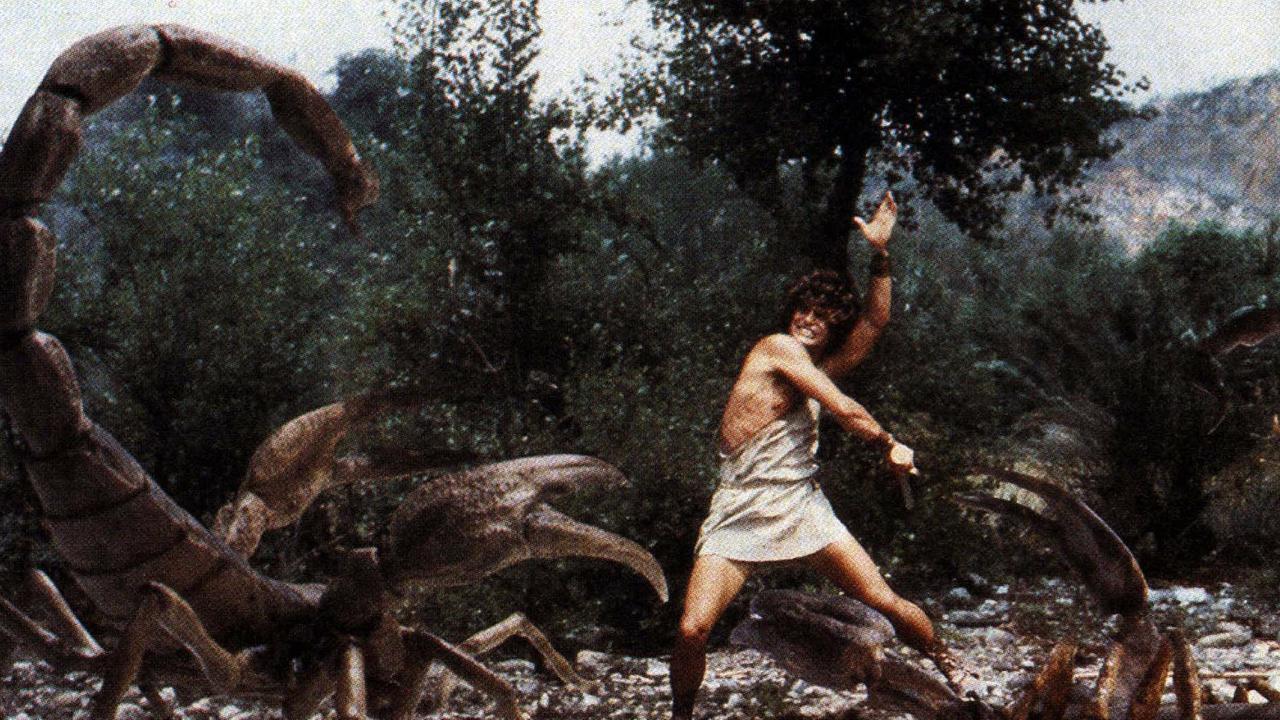
READING LEVEL: GREEN
Heroes in Greek Mythology were men and women of special strength, courage, or ability. They were often of divine* ancestry and were noted for performing superhuman and brave acts.
Some of them went to the Underworld* and fought with monsters, others fought with giants, sea serpents and dragons, while others were set almost impossible tasks by the Kings of the day.
The heroes of Greek Mythology became immortals*, since the Gods acknowledged their fame and courage.
Here we take a look at five famous heroes from Greek Mythology:
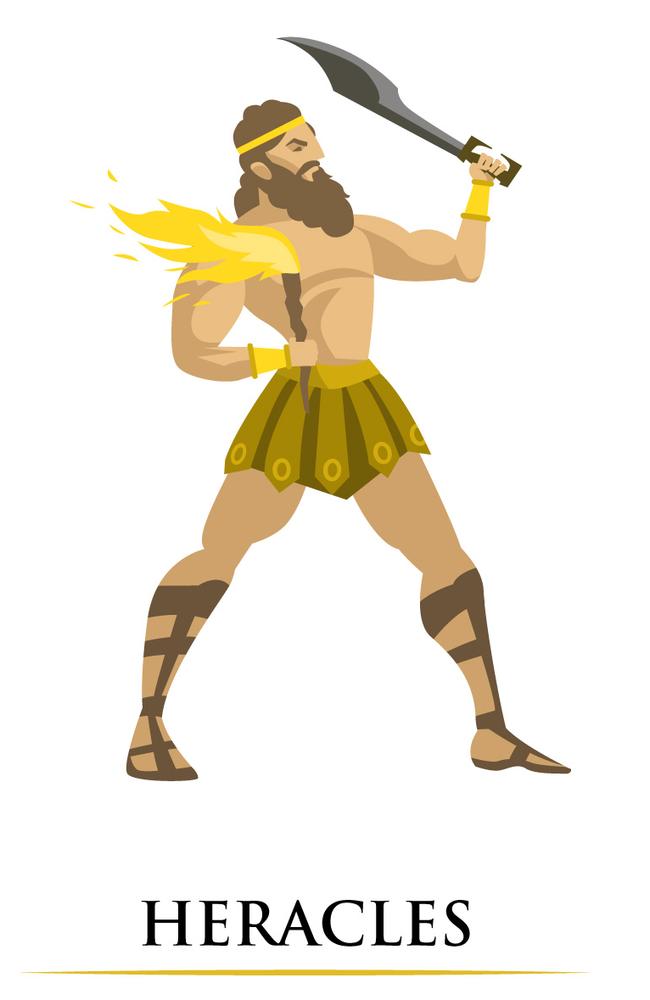
HERACLES
Heracles, who is also known by the name Hercules, was the greatest of all the Greek heroes.
He was an adventurer who had superhuman strength and was said to have strangled two snakes in his crib when he was an infant.
The Goddess Hera hated Heracles, because he was the son of her husband Zeus and another woman, and made him lose his mind. In a confused and angry state, he killed his own wife and children.
When he woke, Heracles was shocked and upset by what he’d done. He prayed to the God Apollo for guidance, and the God’s oracle* told him he would have to serve King Eurystheus for 12 years as punishment for the murders. During those 12 years, the King set these tasks for Heracles:
1. To kill the Nemean Lion
Heracles achieved this after learning the lion’s skin could not be broken with arrows. He followed it back to its den and blocked one entrance before entering through the other. Inside, Heracles found the lion, stunned it with a club and strangled it with his hands. He took the lion’s skin to wear as armour.
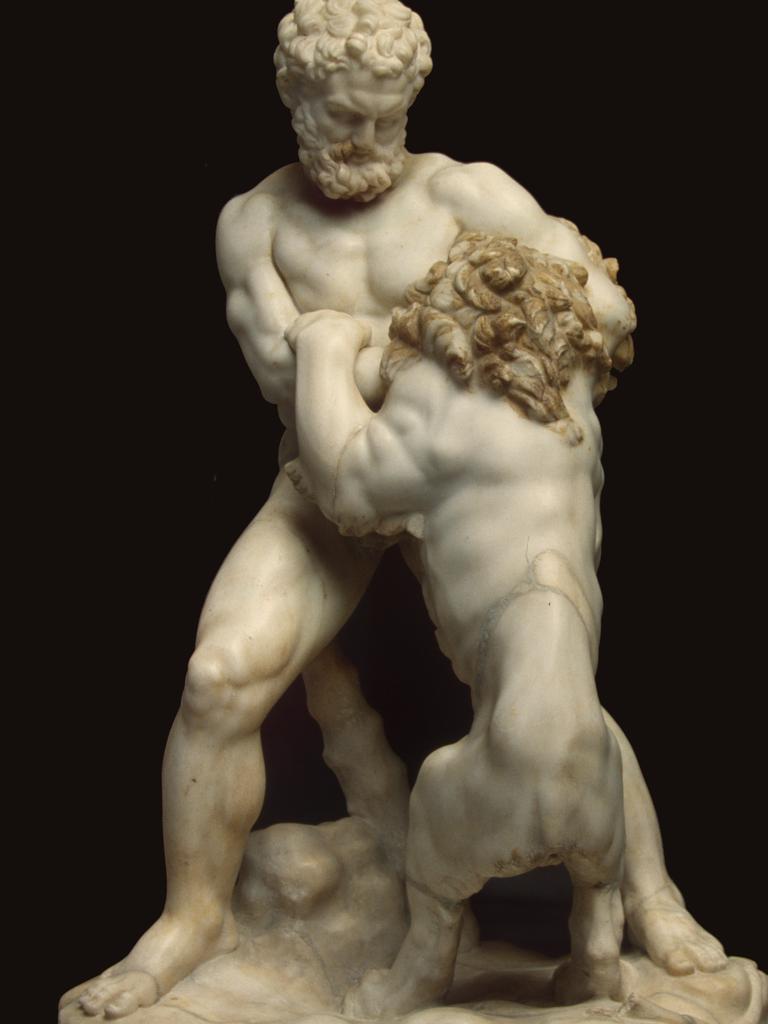
2. To kill the Lernaean Hydra
The Lernaean Hydra was a fearsome nine-headed monster that lived in the swamp of Lake Lerna. It had been specifically raised by Hera to kill Heracles.
The swamp was covered in a poisonous mist, so Heracles had to use a cloth to breathe through. Heracles used flaming arrows to attract the Hydra out of its den.
But Heracles struck trouble when he tried to cut off one of the Hydra’s heads and two new heads grew back.
He asked his nephew Iolaus for help and he had the idea to seal the neck with fire when a head was cut off. This worked.
3. To capture the Erymanthian Boar
King Eurystheus wanted this gigantic, wild boar with big tusks brought back to him alive.
Heracles chased the boar up and down the mountains for almost a week before the animal dropped in exhaustion. He carried the boar back to the castle. As Heracles dropped it at the King’s feet, the boar began to recover and snorted angrily. It frightened King Eurystheus so much that he ran away and the boar disappeared.
4. To capture the Ceryneian Hind
This was a sacred deer with golden horns belonging to the Goddess Artemis and it was so fast it could outrun an arrow. Heracles tracked the animal for a year before shooting it with an arrow and making it unable to walk.
King Eurystheus had given Heracles this task hoping to make the Goddess Artemis angry at him for hurting her sacred animal. But Heracles asked Artemis for forgiveness and promised the deer to her after he had taken it to the King.
Trouble struck when the King wanted to keep the deer. Heracles made the King come and get the animal himself and when Heracles released it, it ran back to Artemis. Heracles told the King he simply wasn’t quick enough to keep it.
5. To clean the stables of Augeas in one day
King Elis’s royal stables were full of sheep and cattle and had not been cleaned for many years. They did not smell nice.
Heracles had a clever idea to change the course of two rivers so they would rush through the stables and clean them out within just a few hours.
He put all the rivers back except one, which provided fresh running water for the animals.
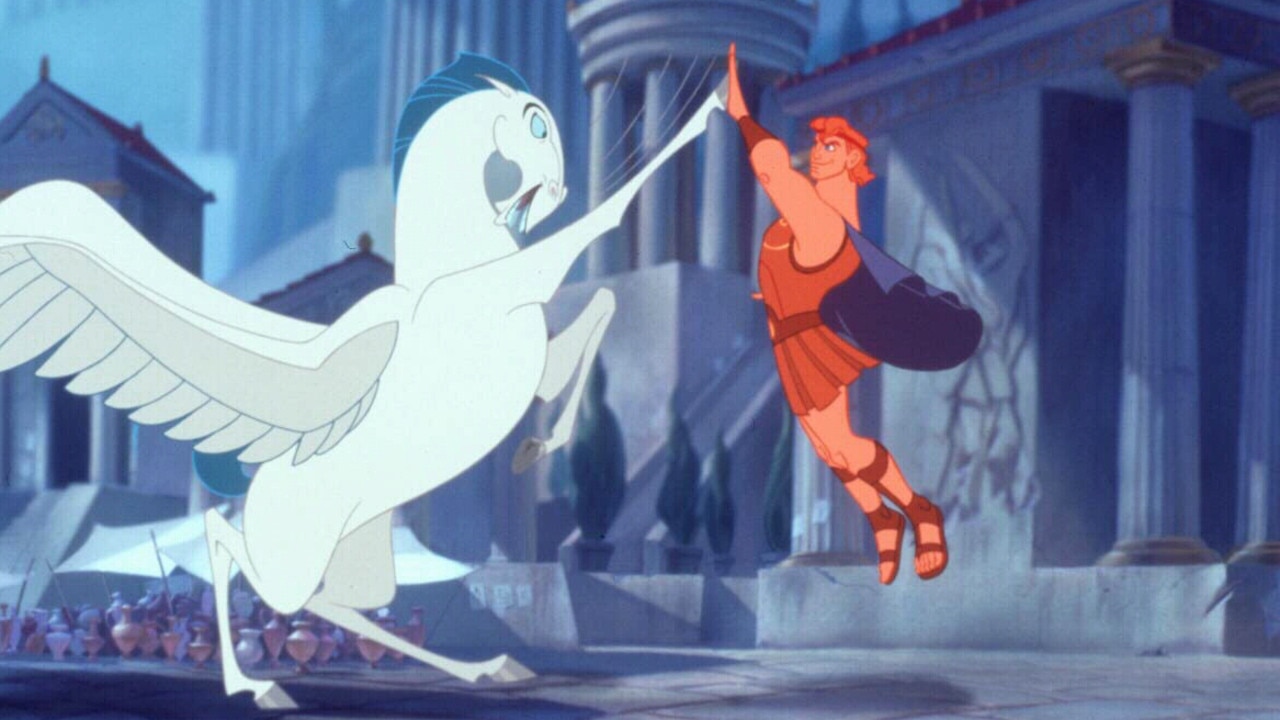
6. To kill the Stymphalian Birds
The Stymphalian birds were scary with pointed beaks, claws that could rip things and feathers made of razor-sharp bronze. They loved to drop their feathers on children and animals.
Heracles made a large shield of bronze to protect his body from the feathers. He used poisoned arrows to shoot all the Stymphalian birds as they flew overhead.
7. To capture the Cretan Bull
The Cretan bull had walked out of the sea and now lived on the island of Crete. It was really big with silvery horns and a white coat.
The Minoans on Crete loved a sport they called bull jumping and they captured the bull for this reason. It was angry at being caught and would toss, gore* and trample anyone who tried to leap over him. One day it escaped.
Heracles found the bull hiding in a forest and it charged at the hero. While the bull’s head was down, Heracles grabbed it by the horns and threw it to the ground. It made the bull dizzy and Heracles tied it up and carried it back to the King.
8. To steal the mares of Diomedes
The mares, or horses, belonged to King Diomedes and were fearsome animals that fed on human flesh. Heracles needed help for this task and asked some friends to join him.
Surprisingly, when Heracles found the horses they were gentle and easily led out of the King’s stables. But then, Heracles was attacked by King Diomedes and the King’s men. During the battle, the King was thrown from his horse and it ate him. The King’s men were frightened by this and ran away with the mares in pursuit.
Heracles chased and caught the horses before taking them back to King Eurystheus.
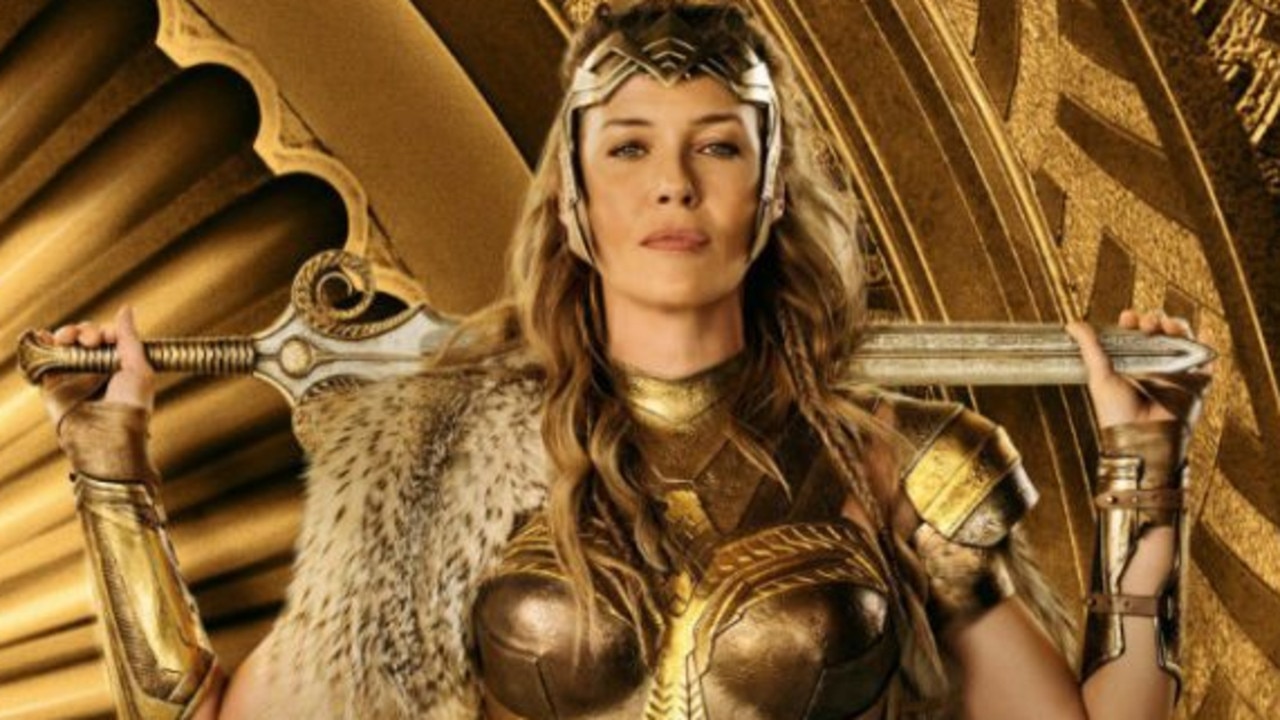
9. To steal the girdle of the Queen of the Amazons
The Amazons were a tribe of fierce women who were not afraid to fight.
King Eurystheus’s daughter Hera wanted the girdle* of Hippolyta, the Amazon Queen, believing it would make her more powerful.
Hippolyta had heard tales of the mighty Heracles. She knew the hero would be a good friend in times of war, so when he arrived on his task she happily gave her girdle to him.
Unfortunately, when Heracles reached for the girdle, the Amazon women thought he was after their queen and they attacked him. During the fight, Hippolyta was accidentally killed by her own people, which sparked more fighting among the women. While this was happening, Heracles made his escape with the girdle.
10. To steal the cattle of the monster Geryon
Heracles was tasked with capturing the entire herd of cattle belonging to the Geryon, which was part man and part monster with three bodies growing from its waist, each with its own head and arms.
The Geryon was very mean and very strong.
The herd was kept on an island and was protected by a two-headed dog. Heracles battled both the Geryon and the dog until they lay on the ground not moving. Heracles quickly loaded the cattle onto his boat and left without knowing if he had killed or only injured his opponents.
The Final Two Labors
After Heracles had completed the first 10 labours, King Eurystheus gave him two more because he wasn’t satisfied he had completed them all on his own.
The final two labours were possibly the most dangerous of them all.
11. To steal the Hesperidean Apples
There was a rumour that the apples were hidden in the garden of the Hesperides (who were magical creatures) and that they gave immortal life to anyone who ate them.
It took Heracles months to find the garden and when he got there, he had to kill a dragon guarding the gate.
To his surprise, Heracles found the “hidden” apples in plain sight on a large tree. He collected them and considered taking a bite, but was unsure if they really would give him immortal life.
When he gave the apples to King Eurystheus, he handed them to his wife. She gave them back to the Hesperides with her apologies.
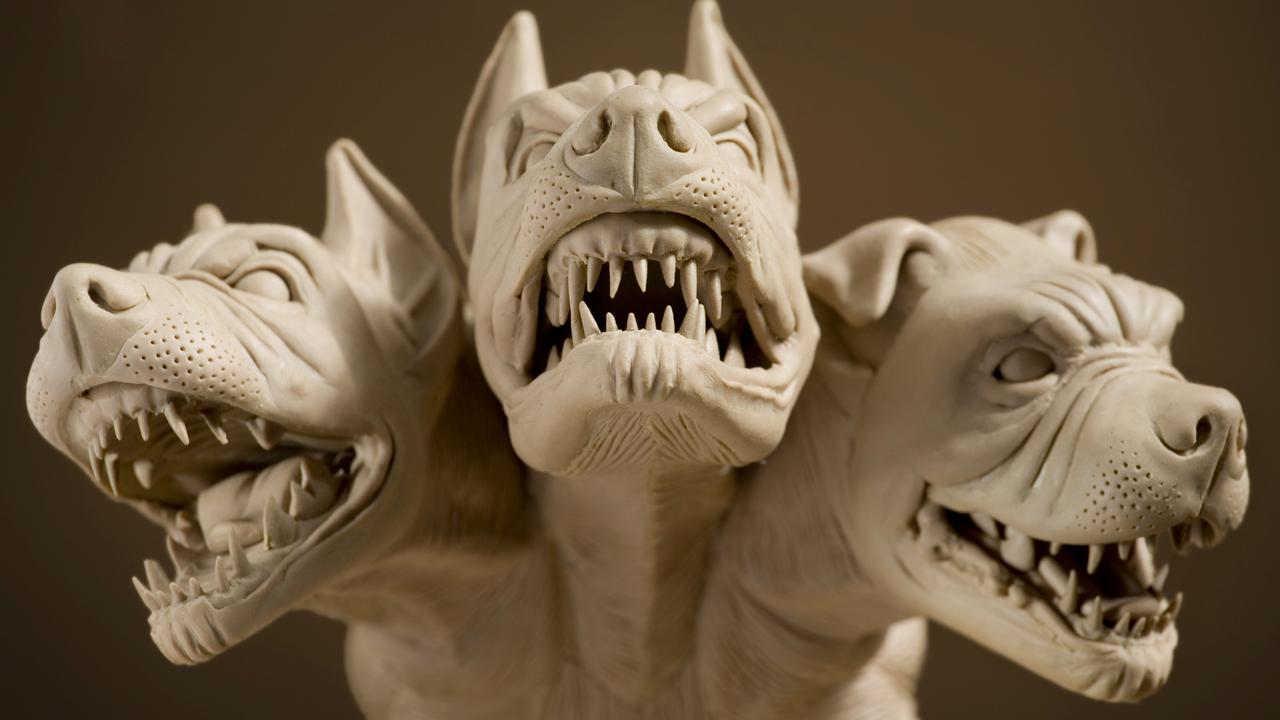
12. To capture Cerberus, guardian of the Underworld
Heracles’ final task was to head into the Underworld and bring back Cerberus, the three-headed dog that guarded the gate. The dog belonged to Hades, God of the Underworld.
Heracles told Hades of his task and struck a deal that he would capture the dog without harming it. Hades agreed and Heracles strangled the dog until it was still alive but not conscious*.
When Heracles took the dog to King Eurystheus, it woke up and frightened the king so badly that he ran away.
What happened next?
When Heracles completed all 12 labours, he was granted immortality by Zeus and was worshipped as a God by all the Greeks.
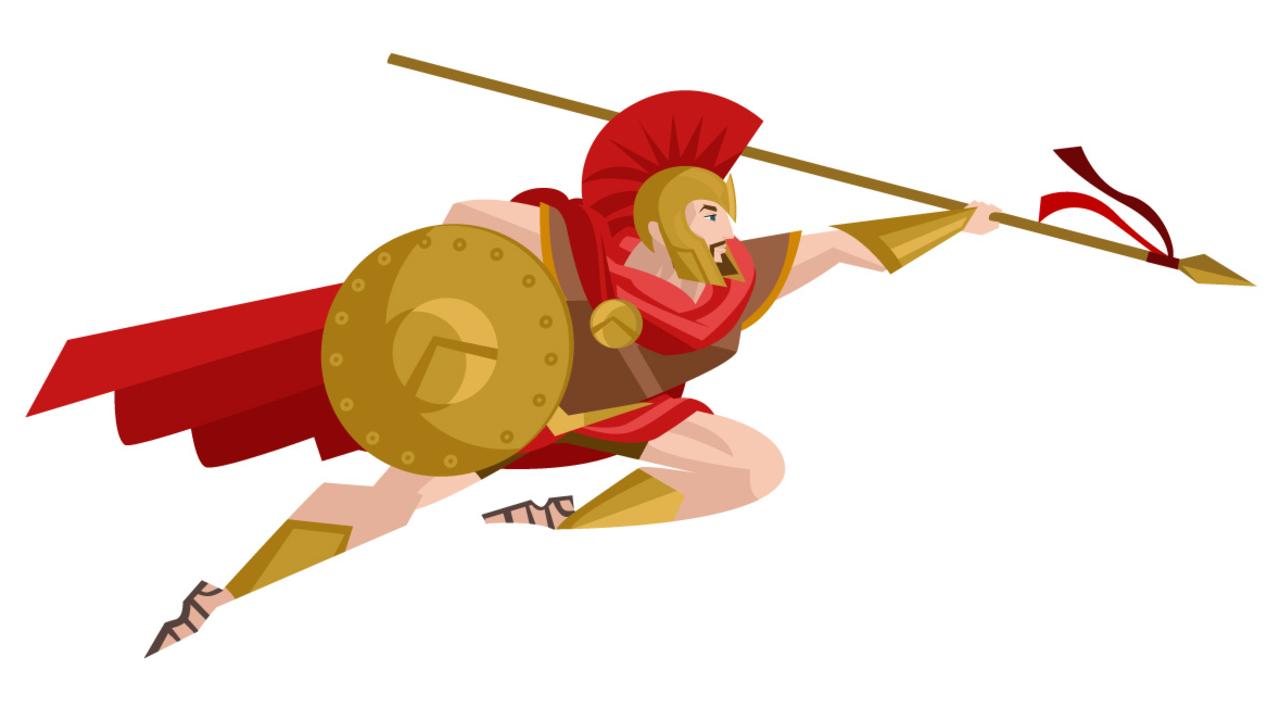
ACHILLES
Achilles was born to a mortal father (Peleus of Thessaly) and an immortal mother (Thetis, a sea nymph).
After his birth, his mother tried several things to make him immortal, the most famous of which was dipping him in the mythical River Styx.
However, she was holding him by the heels when she did this and his heels became the only vulnerable part in his body.
Achilles grew up to be one of Greece's finest warriors.
For 10 years Achilles was a great hero in the Trojan War for the Greeks.
But in the end, Paris, son of the Trojan king, found his weakness and shot him in the heel and killed him.
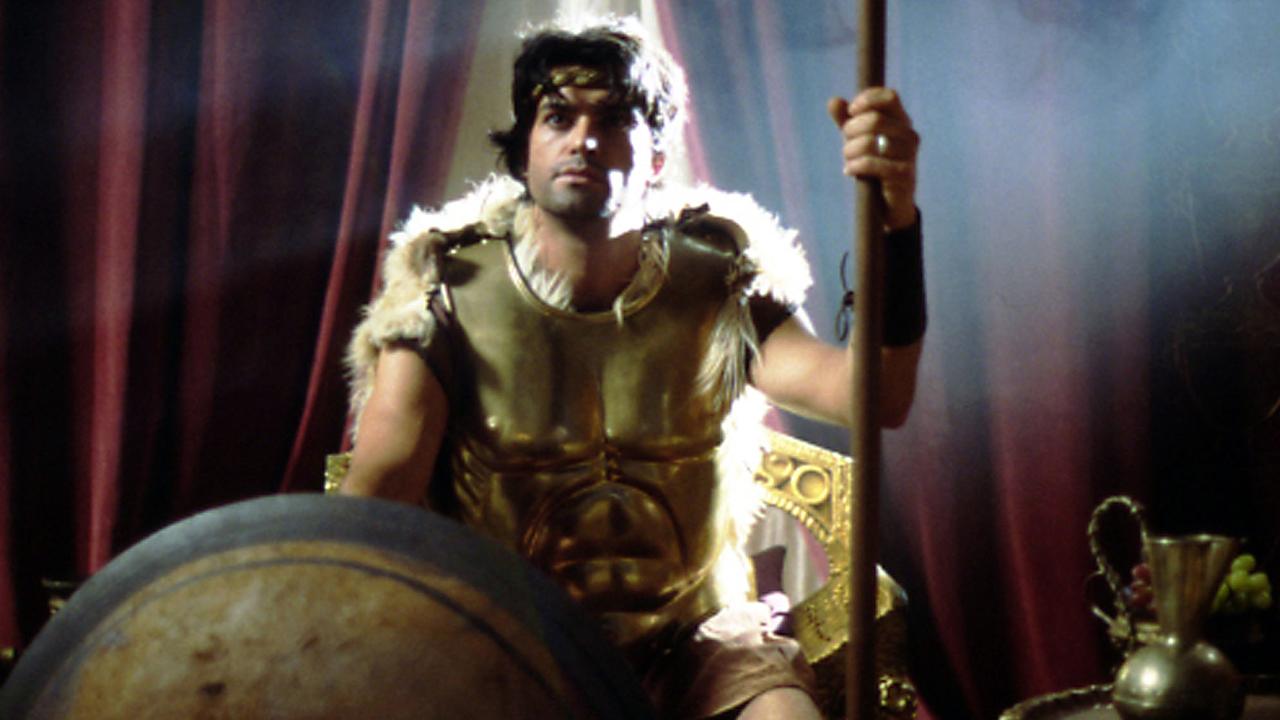
JASON AND THE ARGONAUTS
Jason was the son of the lawful king of Iolcus, but his uncle Pelias had stolen the throne from him. Jason was hidden away by his mother for fear the evil king would kill him.
When Jason grew up, he set out like a proper hero to claim his rightful throne. Jason was promised the crown if he fetched the Golden Fleece, which was the fleece of the golden-woolled, winged ram.
Jason was a favourite hero of the Goddess Athena and she had a ship called the Argo made for him by shipmaker Argus. It was designed to make the longest sea trip yet undertaken. It was based on a galley design but instead of a traditional Greek boat with three oars a side with one rower on each, the Argo had to be pulled by 50 oarsmen.
It was made using oak from sacred* forests, which gave the ship mystical* powers — including the ability to speak and to offer up prophecies* of its own.
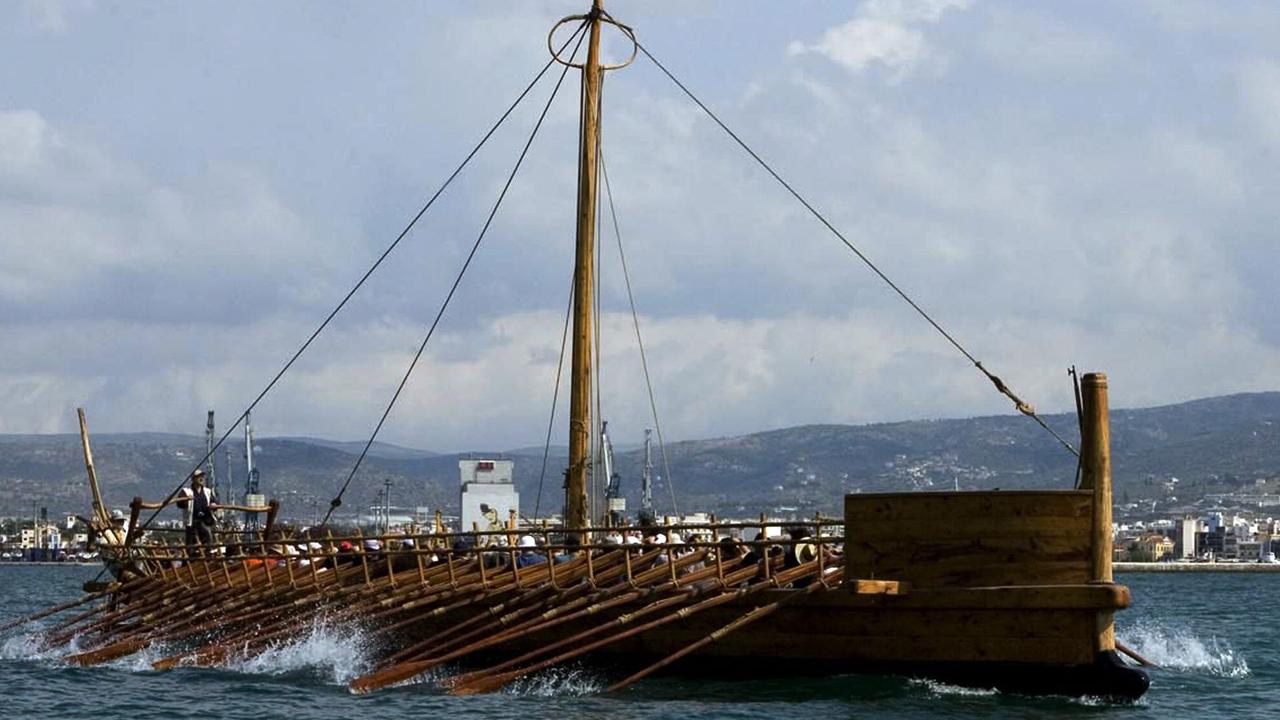
Jason gathered a crew of 50 heroic seamen to sail the Argo. He called them The Argonauts.
It was an incredibly hard journey. They successfully won several battles and cleverly passed through the Symplegades (which were rocks that clashed together and crushed whatever was trying to pass) by sending a dove through first.
They also encountered the Sirens, beautiful creatures that were half woman and half birds, who sang mesmerising songs to attract passing sailors to their deaths. The Argonauts escaped by having Orpheus, the master minstrel, play a song to drown them out.
Finally, Jason and the Argonauts reached Kolchis where the fleece was held and guarded by a dragon.
But King Aeetes would not give up the fleece until Jason used the king’s fire-snorting bulls to plough the field of Ares. That accomplished, he was then asked to sow the field with dragon’s teeth from which armed men were to spring.
After all this, Jason fell in love with the king’s daughter Medea and she helped Jason get the Golden Fleece from her father after putting the dragon to sleep.
Jason and Medea returned the fleece to Iolcus. Medea then killed Jason’s half-brother Pelias so Jason could be king. But when her evil deed was discovered, she and Jason had to live in the Greek city of Corinth where Jason was forced to marry the princess of Corinth so they could stay.
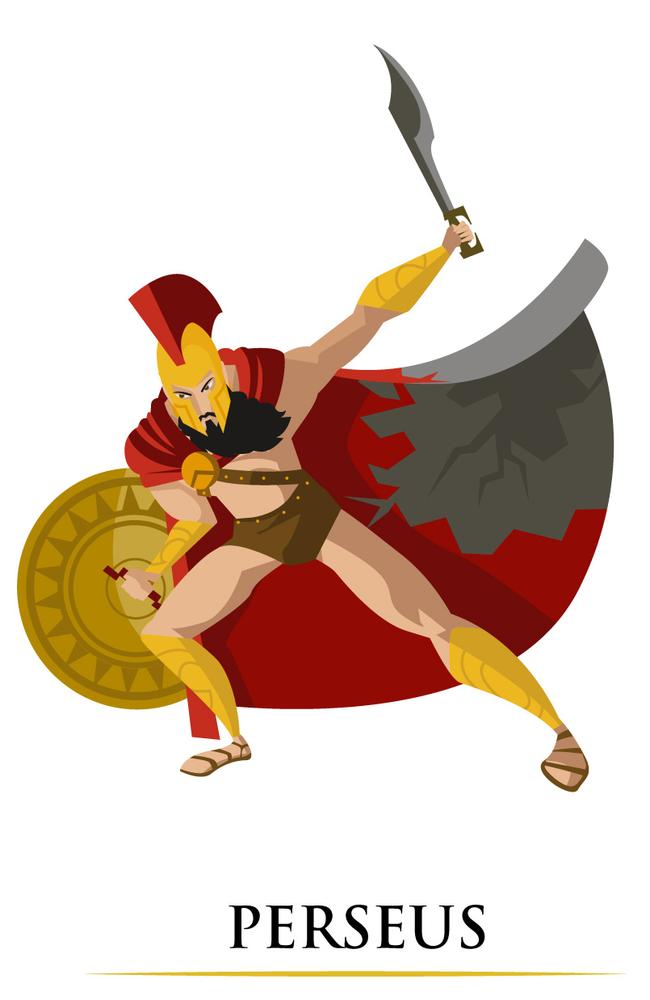
PERSEUS
King Akrisios of Argos was told by an oracle that he would be killed by his grandchild. Because of this prophecy, he locked his daughter Danae in a tower so she could not have a child. But the God Zeus could enter in the form of golden rain, and together they had a son Perseus.
After Perseus had grown up on the island of Seriphus, he was taking part in some Games and threw a discus which accidentally killed his grandfather Akrisios — just as the oracle predicted.
Later, King Polydectes, who desired his mother Danae, tricked Perseus into promising to obtain the head of Medusa, who was a mortal Gorgon with snakes for hair and the ability to turn men to stone if they looked at her face.
He asked Goddess Athena and the God Hermes for help and the two of them, together with the nymphs, provided winged sandals to fly him to the end of the world where the gorgons lived, a cap that made him invisible, a sword and a mirrored shield. The shield was the most important tool since it allowed him to see a reflection of Medusa’s face and avoid being turned into stone.
When he cut Medusa’s head off, from the drops of her blood suddenly appeared two offspring: Pegasus, a winged horse, and Chrysaor, a giant or a winged boar. It’s believed that those two were Medusa’s children with Poseidon, the God of the Sea.
He then returned to Seriphus and rescued his mother by turning King Polydectes and his supporters to stone at the sight of Medusa’s head.
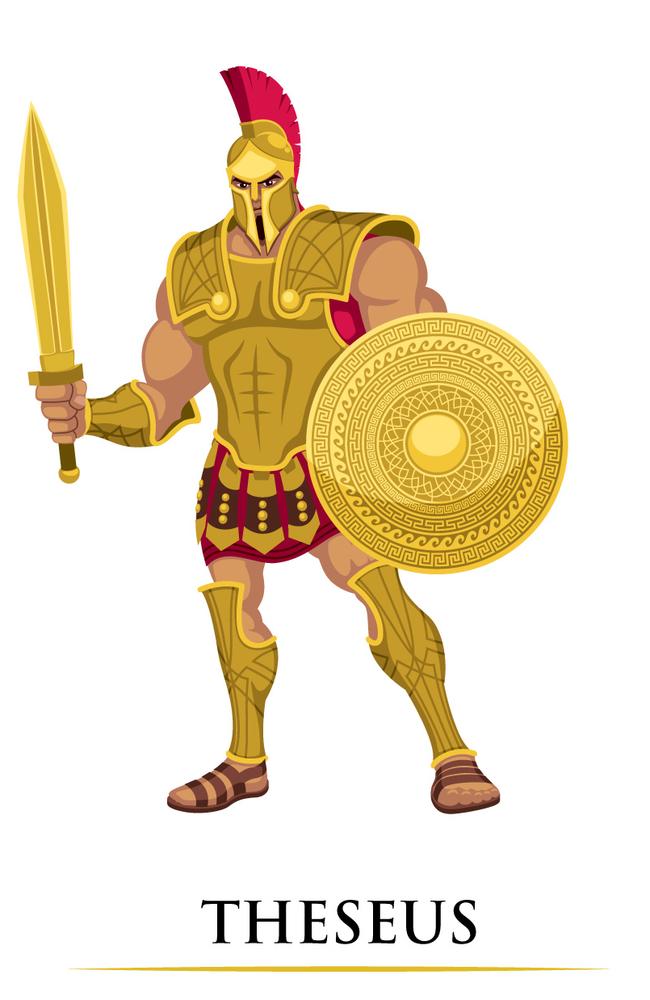
THESEUS
Prince Theseus of Athens was known for his victories over many monsters, but the most famous was the Minotaur, which was half man and half bull.
The Minotaur lived in a maze on the island of Crete.
Every year — as part of a deal with the people of Crete so they wouldn’t attack them — the people of Athens had been forced to send over 14 young people for the Minotaur to eat alive.
Theseus understood the importance of the deal, but did not believe children should be sent to be eaten by the Minotaur.
He arranged for himself to be the 14th child sent to the Minotaur.
He teamed up with Princess Ariadne, who lived on the island and, using a sword and a ball of magic thread he tied to the gate at the entrance, he found his way in and out of the maze and killed the beast.
GLOSSARY
- divine: of or like a God
- Underworld: another word for hell
- immortals: a God or Goddess or person who lives forever
- oracle: a person acting as a medium through whom advice or prophecy was sought from the Gods
- gore: pierce with a horn or tusk
- girdle: a device worn around a woman’s waist to make it appear smaller
- conscious: awake
- sacred: connected to a God or dedicated to a religious purpose
- mystical: spiritual
- prophecies: predictions about the future
EXTRA READING
Part Four: Greek Goddesses of Mt Olympus
Part Six: The villains of ancient Greece
QUICK QUIZ
- Who set the 12 tasks for Heracles to complete?
- How did Heracles avoid looking at the face of Medusa?
- How many heads did the Lernaean Hydra have?
- What did Perseus use to fly to the end of the world?
- Why did Theseus need a ball of magic thread?
LISTEN TO THIS STORY
CLASSROOM ACTIVITIES
Refer to the accompanying Greek Myths and Legends classroom workbook with 25 activities. Can be purchased for $5 including GST at https://kidsnews.myshopify.com/products/greek-myths-and-legends.
HAVE YOUR SAY: Which of Heracles’ 12 labours do you think took the most courage? Why?
No one-word answers. Use full sentences to explain your thinking. No comments will show until approved by editors.
